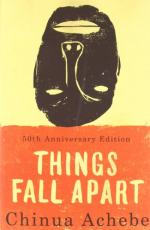|
|
Things Fall Apart Topic Tracking: Colonization
Chapter 15
Colonization 1: The first signs of colonization come to Abame when the first white man appears. The elders of the village consulted the Oracle and were told that the white man would soon be followed by others like him and that he would destroy their way of life, so they killed him. Not long after that, other white men massacred the people of the village because they killed the first white man who came to their village.
Chapter 16
Colonization 2: The white men send in missionaries to instil a religion that encourages peace as the beginning stages of colonization. If they can change the fundamental beliefs of the tribe, then they can control the natives more easily.
Chapter 17
Colonization 3: Already the introduction of a foreign element, in this case religion, begins to tear the structural fabric of the Ibo society. This new religion introduces the separation of Okonkwo and his son in a society that is based on the strength of the family unit. The division begins.
Chapter 18
Colonization 4: The people of Mbanta do not fear the religion of the white men because it has yet to interfere with their lives. What they don't realize is that the idea of colonization is to quietly gain a foothold in the country and then move in and take over when the country has been destabilized enough to be ruled by outside forces. With religion acting as the foothold, it makes it easier for a foreign government to take over because most religions advocate peace and control a great part of people's lives.
Colonization 5: The presence of this new and foreign religion begins to grow and eventually it makes it difficult for the tribe to maintain order in its own community. What started out as something small and separated from the village and its rule has grown into a source of conflict. Christian disregard for the customs and religion of the tribe creates an atmosphere of lawlessness within the village. By ostracizing the Christians, the rulers of Mbanta are trying to regain some of their power to lead their people and protect their way of life.
Chapter 20
Colonization 6: Obierika and Okonkwo take note of how the white man came to their land peacefully and quietly at first but are now taking over by imposing their government and their rules onto Ibo society. The missionaries came and created division within the most basic element of Ibo society, their religion. From that point of separation, introducing a government to rule the divided people was easy because they could not stand together to protect their way of life.
Chapter 21
Colonization 7: Because the white men brought trade into Umuofia, not everyone in the village was united against them since the white men had provided a new way for the villagers to profit. With thisopportunity, they were willing to accept the confines of the white man's rule because they weren't willing to sacrifice the new trading community to fight for their independence.
Chapter 23
Colonization 8: The District Commissioner tricked the tribal leaders of Okonkwo's village (Okonkwo among them) to come to his headquarters and then he imprisoned them for burning the Christian church. He demands that a fine (ransom) of two hundred cowries be paid for their return, and then he entrusts their care to his corrupt court messengers. The messengers not only beat the men and starve them, but also raise the price of the ransom so that they can receive a cut of the money for themselves.
Chapter 24
Colonization 9: Just when Umuofia seemed ready to lash out against colonization, the court messengers step in to break them up. Rather than follow their orders, Okonkwo kills the head messenger, but he sees that his people will not rise up against their oppressors because they let the other messengers, the henchmen of the white government, escape.
Chapter 25
Colonization 10: Colonization finally drives Okonkwo to take his own life because the oppression is too great for his divided tribe to overcome. Okonkwo can't take living under the rule of foreign men who don't speak his language or know his customs. So, rather than bear the yoke of colonization, he hangs himself.




